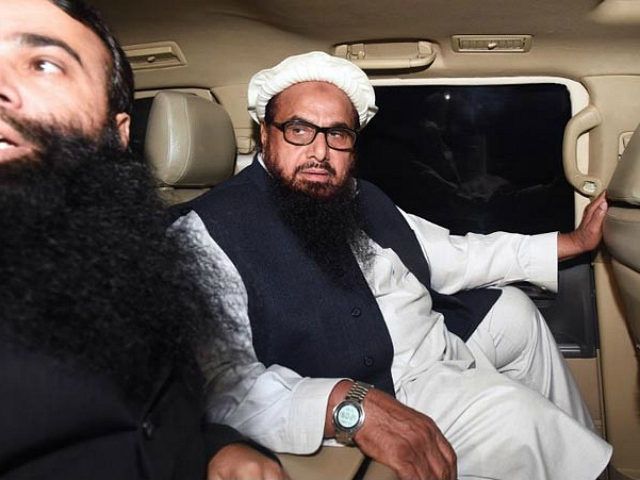Fear of being added to the list of Muslim-majority countries covered by President Donald Trump’s executive order limiting immigration has prompted Pakistan to arrest the prominent Islamist chief of the terrorist group Lashkar-e-Taiba (LeT), according to The Washington Post (WaPo).
LeT is a U.S.-designated terrorist group in Pakistan primarily focused on the disputed Muslim-majority Himalayan region of Kashmir. It has been blamed for the 2008 massacre in Mumbai, India, that left at least 166 people dead and has been linked to attacks against the U.S.-led coalition in Afghanistan.
“There was pressure coming from the U.S. on Pakistani authorities to either arrest Hafiz Saeed or face the sanctions, and the government succumbed to that pressure,” declared Nadeem Awan, a spokesman for the terrorist organization-affiliated leader.
Late on Monday, Pakistani authorities reportedly arrested Saeed, who has a $10 million U.S. bounty on his head, at a mosque in Lahore and transported him to his residence where he has been placed under “preventative detention,” according to Pakistan’s Interior Ministry.
Nevertheless, WaPo notes the anti-Islamabad and anti-India cleric, who has been repeatedly detained and subsequently released in the past, “could be freed in six months.”
Saeed served as the leader of LeT before it reportedly changed its name to Jamaat-ud-Dawa (JuD), a group considered to be a front for the jihadist organization. Currently, the cleric is the chief of JuD, which is listed as a terrorist organization by the United Nations.
“Shortly after LeT was designated as an FTO [foreign terrorist organization], Saeed changed its name to Jamaat-ud-Dawa (JUD) and began humanitarian projects to circumvent restrictions,” notes the U.S. Department of State.
The Post reports:
The sudden house arrest of a high-profile Islamist cleric in Pakistan on Monday sparked peaceful protests Tuesday by his followers, who condemned it as a government effort to appease the Trump administration after it banned visitors and refugees from seven Muslim-majority countries over the weekend — and after a top presidential aide hinted that Pakistan could be added to the list.
During the protests on Tuesday, an estimated 200 supporters of the jihadi leader torched U.S. and Indian flags.
Pakistan’s Interior Minister Chaudhry Nisar “hinted that a crackdown” against LeT “was imminent,” reports the Agence France-Presse (AFP) news agency.
Islamabad has dismissed the suggestion that foreign pressure triggered the detention of the LeT leader.
Pakistan insists “they were only implementing the terms of a U.N. resolution that declared Saeed’s group a terrorist organization after the Mumbai attacks,” reports WaPo.
“This is something India has wanted for years, and it was a major stumbling block to resuming dialogue,” Rifaat Hussain, a professor of government and public policy at Pakistan’s National University of Sciences and Technology, told the Post, referring to Saeed’s arrest. “There was also a feeling that Hafiz Saeed had gotten too big for his boots and was becoming a nuisance. This was mostly a desire for a restart.”
India, Pakistan’s fellow nuclear power, neighbor, and rival greeted the arrest of Saeed with skepticism.
Saeed has been detained and released several times in the past and accused but never convicted of terrorism, a fact that did not go unnoticed by Indian government officials.
India has long demanded tougher action against the LeT-linked jihadi leader.
LeT is fiercely opposed to India’s claim to Kashmir, home to various deadly clashes between the India and Pakistan last year.
India, Pakistan, and China all have competing claims to the Kashmir region.
In an interview with CBS News’s Face the Nation last Sunday, White House Chief of Staff Reince Priebus suggested the President Trump’s executive order imposing immigration limits on Iran, Iraq, Libya, Sudan, Yemen, Syria, and Somalia may be extended to Pakistan.
Pakistan has been repeatedly accused by the Pentagon, India, and Afghanistan of serving as a sanctuary for terrorists.
Two top U.S. GOP lawmakers have proposed designating Pakistan a state-sponsor of terrorism.

COMMENTS
Please let us know if you're having issues with commenting.